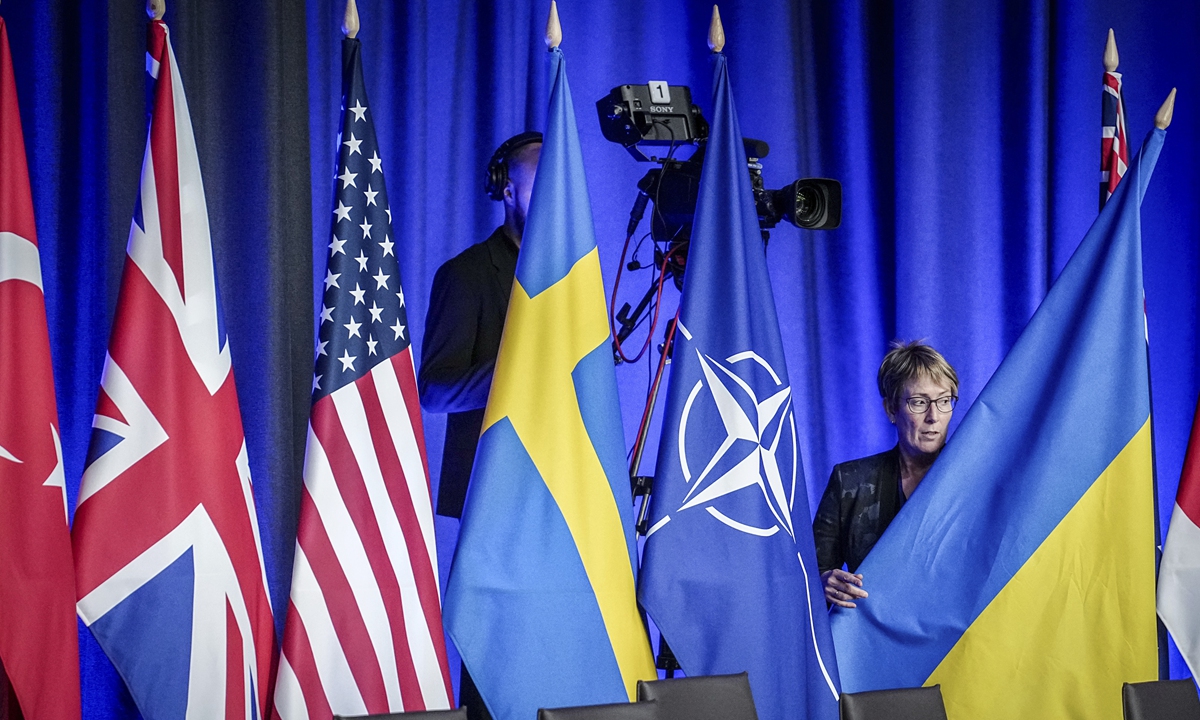BEIJING – Ukrainian President Volodymyr Zelensky reportedly made a surprise visit to the NATO headquarters in the hope of securing aid from the military alliance on Wednesday local time. Chinese analysts commented on Thursday that Zelensky’s NATO headquarters visit, his first since the outbreak of the Russia-Ukraine conflict in early 2022, was an obvious sign of his growing concern over NATO diverting assistance from Ukraine to Israel.
They also pointed out that the US and NATO’s assurance of continuing aid to Kiev is fragile as the prolonged Russia-Ukraine conflict is becoming “a hot potato,” especially as many of these countries face election campaigns, testing the will of key allies.
At NATO, Zelensky said he was counting on the West to supply more air defense support, long-range missiles and artillery to help his country “survive this next winter.” And he said that “of course, everybody’s afraid” that Western assistance would dwindle as the conflict between Israel and Hamas in Gaza continues, the New York Times reported.
Top NATO officials sought to reassure Zelensky by pledging more than $2 billion in additional military aid to be delivered before winter sets in. Likewise, US Defense Secretary Lloyd Austin vowed on Wednesday that Washington’s military support for Israel will not compromise its commitment to Ukraine, the AFP reported.
However, the New York Times, which reported the visit, cited unnamed “senior officials” as saying that Ukraine might have cause for concern, given the situation in Israel and the budget fight in the US Congress that threatens American war funding. At least some of the American weapons flow could dry up in a matter of months if the money is not approved quickly, according to one senior US official who spoke to journalists in Brussels on condition of anonymity.
It is natural for Zelensky to take note of the outbreak of the fresh Palestine-Israel crisis, but as long as the conflict is limited to Gaza, the US-led West would not have to divert significant military resources to Israel, as Hamas is in fact no match for it, Li Haidong, a professor at the China Foreign Affairs University, told the Global Time on Thursday.
What the US fears is the spillover of the conflict, which could lead to a full scale Middle East war, with other Muslim and Arab countries getting involved, and the US is gearing up in the region to deter Iran, Li explained.
Still, it is likely to be a challenging winter for Ukraine. The war of attrition puts great pressure on NATO member countries and the US, especially because many of these countries are entering election season, and the public is strongly opposed to diverting resources toward war, analysts said.
Having the resources to balance two conflicts is one thing, but having the political will under domestic pressure to actually do so is another, Li said.
Within the US, supporting Israel is a matter of “political correctness” and enjoys bipartisan agreement, however the case for Kiev is more complicated, Song Zhongping, a military expert and TV commentator, told the Global Times on Thursday.
Kiev’s domestic corruption issues have impeded US policymaking when it comes to military aid, where Republicans would like to ensure the funding is spent in the right place, causing fractures within the Congress, Song said.
Opposition to continuing current levels of support to Ukraine is undoubtedly rising, so the Congress is likely to impose restrictions on aid, Li noted. “However, whether they will completely refuse aid to Ukraine, personally, I believe the likelihood is low. The US still needs to assist Ukraine, even if the funding from the Congress is reduced or, in the most extreme case, not allocated at all.”
It is worth noting that even without the emergence of the latest Palestine-Israel crisis, US and Western military assistance to Ukraine had already reached tipping point, with several European countries already announcing decisions to stop aiding Kiev, Cui Heng, a scholar from the China National Institute for SCO International Exchange and Judicial Cooperation, told the Global Times on Thursday.
Objectively speaking, supporting Israel, at the moment, is more urgent and of greater geopolitical importance for the US and the West than supporting Ukraine, Cui pointed out.
The 2024 election is the most important thing for both the GOP and the Democrats, and there are issues that take greater priority over Ukraine, such as China-related matters and the Jewish lobby, which are key to the vote, Cui said.

